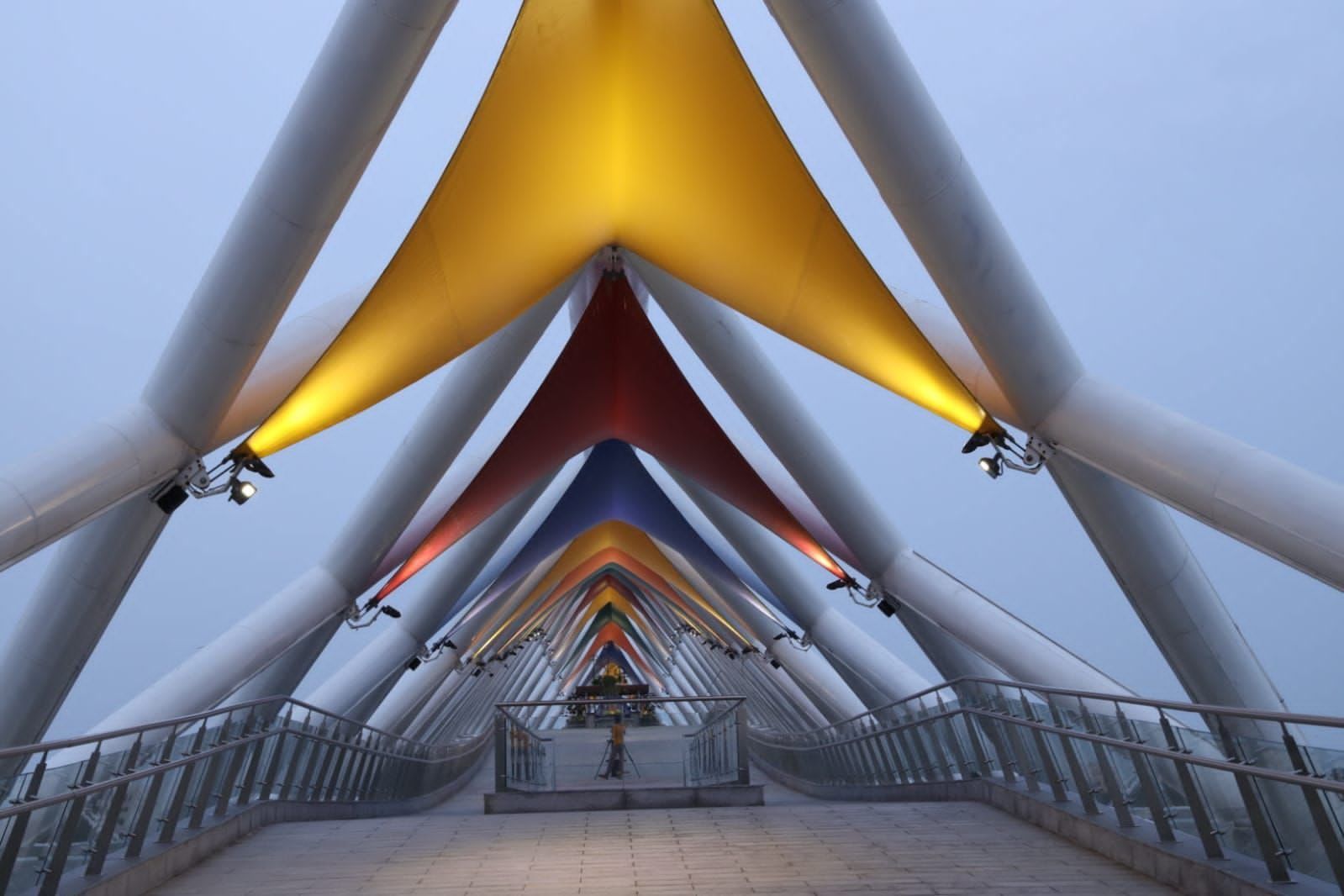


Indian Prime Minister Narendra Modi inaugurated the nation's longest sea bridge, Atal Setu or Mumbai Trans Harbour Sealink (MTHL), on January 12, 2024. The bridge spans 21.8 km, with 16.5 km over the sea and 5.5 km on land, and is constructed at a cost of over Rs 17,840 crore. The bridge is named after former Prime Minister Atal Bihari Vajpayee and promises to reduce travel time and improve connectivity, boosting the economy and facilitating faster transportation to airports and nearby cities.
The Marvelous Atal Setu: India's Longest Sea Bridge
Introduction: Indian Prime Minister Narendra Modi unveiled the Atal Setu, India's longest sea bridge, on January 12, 2024, marking a significant milestone in the nation's infrastructure development. This article explores the details, background, and impact of this remarkable project.
Details and Design: Atal Setu, also known as the Mumbai Trans Harbour Sealink (MTHL), boasts a majestic length of 21.8 kilometers, with 16.5 kilometers stretching over the sea and 5.5 kilometers on land. Constructed at a colossal cost of over Rs 17,840 crore, the bridge is an architectural marvel and a testament to India's engineering prowess.
Purpose and Benefits: The primary objective of Atal Setu is to enhance connectivity and reduce travel time between Mumbai and Navi Mumbai. It will significantly ease traffic congestion, improve accessibility to nearby cities and airports, and stimulate economic growth in the region. The bridge will transform transportation and logistics, facilitating faster movement of people and goods.
Environmental Considerations: The construction of Atal Setu adhered to stringent environmental regulations to minimize ecological impact. The bridge incorporates measures to protect marine life and ecosystems, including sustainable construction techniques and the establishment of marine sanctuaries.
Top 5 FAQs and Answers:
Q: What is the total length of Atal Setu? A: Atal Setu spans a total length of 21.8 kilometers, comprising 16.5 kilometers over the sea and 5.5 kilometers on land.
Q: Why is the bridge named Atal Setu? A: The bridge is named after former Indian Prime Minister Atal Bihari Vajpayee, in honor of his contributions to the nation's infrastructure development.
Q: What is the estimated cost of Atal Setu? A: The total cost of constructing Atal Setu is estimated to be over Rs 17,840 crore, making it a significant investment in India's infrastructure.
Q: How will Atal Setu impact connectivity? A: Atal Setu is expected to significantly improve connectivity between Mumbai and Navi Mumbai, reducing travel time and facilitating faster movement of people and goods.
Q: What are the environmental considerations associated with Atal Setu's construction? A: During the construction of Atal Setu, strict measures were implemented to minimize ecological impact, including the protection of marine life and the establishment of marine sanctuaries.
Links for Further Information:
Conclusion: The inauguration of Atal Setu marks a transformative moment in India's infrastructure development. This iconic bridge will not only enhance connectivity and boost economic growth but also serve as a symbol of India's engineering expertise and commitment to sustainable infrastructure.

Amid massive anti-government protests and a constitutional crisis in Nepal, top sources reveal that former chief justice Sushila Karki is likely to be announced as the interim Prime Minister. This decision comes after days of political turmoil and unrest, with President Ramchandra Paudel pushing for a solution within the constitutional framework. Army troops continue to patrol sensitive areas while representatives of the youth-led 'Gen Z' hold talks with military officials to finalize the transitional government.

The political world was rocked by tragedy as Charlie Kirk, founder of Turning Point USA, was fatally shot while speaking at a Utah college. President Trump expressed his shock and sadness over the loss of his close ally, and offered his condolences to Kirk's wife Erika, who is said to be devastated by the news. While the investigation into the shooting is ongoing and the killer is still at large, the President has announced plans to award Kirk with the Presidential Medal of Freedom posthumously.

In recent years, three Asian countries – Sri Lanka, Bangladesh, and Nepal – have experienced widespread protests that have resulted in the ousting of a president in Sri Lanka and the resignation of a prime minister in Nepal. The common theme among these movements is public frustration with corruption, inequality, and economic disparities, as well as a growing resentment towards the ruling elite. These protests serve as a reflection of the people's dissatisfaction with the entrenched political systems in these countries.

During a Q&A session at Utah Valley University, Turning Point USA founder Charlie Kirk was shot and killed. A video of the incident showed police detaining a man who was not the shooter. After a manhunt, the real suspect was caught and confirmed by FBI Director Kash Patel. President Trump expressed his condolences and ordered flags to be flown at half-staff.

After a gunman opened fire on Charlie Kirk during a Q&A session at an outdoor event in Utah, the FBI director revealed that the suspect is now in custody. The shooting, which was initially thought to have been carried out by an older white man, is now being investigated as a political assassination. Utah Governor Spencer Cox also spoke out, expressing his condolences for Kirk and emphasizing the importance of free speech and debate in shaping ideas.

In Maharashtra, leaders from the ruling BJP party have expressed outrage over a proposed Muslim "halal lifestyle township" near Mumbai, accusing it of promoting "religious separation." However, this outcry ignores the ongoing issue of Muslim housing discrimination in India, where Muslims are routinely denied homes in Hindu-majority neighborhoods and often forced into ghettos. This hypocritical stance from the BJP only serves to further marginalize and exclude the Muslim community, while demonstrating a lack of understanding of the challenges they face.

The Indian parliament is currently in disarray as the ruling Modi government faces a boycott from the opposition INDIA alliance over the introduction of three anti-corruption bills. The situation escalated when a few opposition members resorted to tearing copies of the bills during proceedings, prompting the government to refer the bills to a Joint Parliamentary Committee (JPC). However, this committee has now become a flashpoint, with the majority of the opposition refusing to participate. The Congress remains undecided, torn between internal opinions. This boycott is unprecedented in parliamentary history and has raised concerns about the opposition parties being portrayed as divided.

In a shocking revelation, it was uncovered that six people had been posing as "Arpit Singh" and holding full-time X-ray technician jobs in UP's health department for nearly nine years. Manipulating weak background checks and lack of coordination between district offices, these imposters drew separate salaries from each district, resulting in estimated losses exceeding Rs 4.5 crore to the public exchequer. The wrongdoing came to light during a digitisation drive when data comparison exposed the duplicate postings. A thorough investigation has been initiated and an FIR has been filed against the six "Arpit Singhs" at Wazirganj police station in Lucknow.

The carefully managed alliance between AIADMK and BJP in Tamil Nadu is facing turbulent times as the AIADMK leaders complain of increasing interference from the BJP into CM Palaniswami's leadership. Reports suggest that former AIADMK leader Panneerselvam is planning to start his own party, but has been asked to wait until December by the BJP. This has sparked talks of a possible exit from the NDA among the AIADMK ranks. The recent sacking of leader Sengottaiyan for demanding the return of expelled leaders further highlights the strained relations between the two parties. Some AIADMK leaders are advocating for an exit from the NDA in light of the current situation.

A new FIR has been filed against Dr Abhijeet Pandey, a dermatologist and assistant professor at RKDF College in Bhopal, for illegally running a cosmetic treatment clinic without proper registration and license. The case was filed on the complaint of a clerk, who reported that a team of officials had found Pandey using unregistered cosmetic treatment machines and illegally packaging and selling medicines in his two occupied flats in the MP Nagar area. This comes after Pandey was arrested in March for abetting the suicide of his wife, who was also a doctor and had allegedly faced harassment from her husband.